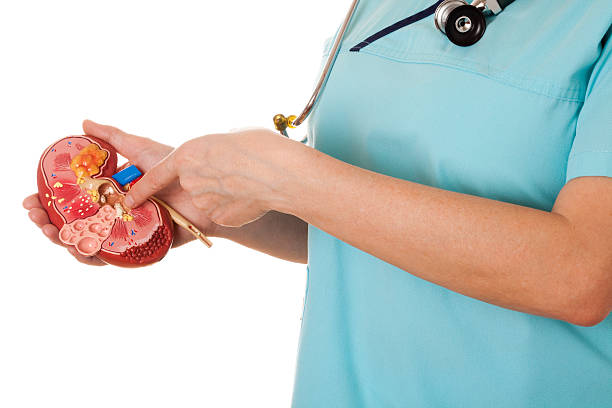Make an Appointment
Kidney stones are hard deposits consisting of minerals and salts that develop inside the kidneys. Also, they are called renal calculi, nephrolithiasis, or urolithiasis.
A number of things, such as food, excessive body weight, different illnesses, certain supplements, and medications, might result in kidney stones. Any section of the urinary tract, from the kidneys to the bladder, might be impacted by kidney stones. When urine becomes concentrated, minerals can crystallise and adhere to one another and frequently lead to stones.
Kidney stones can be painful to pass, but if they are detected early enough, they often do not have any permanent effects. You might only need to take painkillers and drink a lot of water to clear a kidney stone, depending on your circumstances. Surgery might be required in other situations, such as when stones become trapped in the urinary tract, are linked to an infection, or lead to complications.
If there is a higher than average risk of getting kidney stones again, then the doctor may suggest preventive medication.
Causes
Although there is typically no single cause for kidney stones, several factors may increase your chance of having them. Kidney stones build when your urine contains more crystal-forming components than the fluid in your urine can dissolve, such as calcium, oxalate, and uric acid. If your urine lacks chemicals that prevent crystals from attaching, kidney stones are more likely to form.
Types of kidney stones
Finding out what kind of kidney stone you have can assist identify its source and may provide information on how to lower your risk of developing additional kidney stones. If you pass a kidney stone, attempt to keep it if you can so you may give it to your doctor for analysis.
The different types of kidney stones include:
- Calcium stones – Calcium stones, typically in the form of calcium oxalate, make up the majority of kidney stones. Your liver produces oxalate every day, and you can also get it from food. The oxalate level of some fruits, vegetables, nuts, and foods like chocolate is high.
- The amount of calcium or oxalate in urine can rise due to dietary factors, excessive vitamin D dosages, intestinal bypass surgery, various metabolic illnesses, and dietary factors.
- Calcium stones can occur in the form of calcium phosphate as well. This kind of stone occurs more frequently in metabolic disorders such as renal tubular acidosis. It might also be connected to several drugs used to treat migraines or seizures, like topiramate (Topamax, Trokendi XR, Qudexy XR).
- Struvite stones – Urinary tract infections can cause the formation of struvite stones. Sometimes with few symptoms or little warning, these stones have the potential to grow swiftly and become extremely huge.
- Uric acid stones – Uric acid stones can occur in those who lose too much fluid due to chronic diarrhoea or malabsorption, those who eat a high-protein diet, and those who have diabetes or metabolic syndrome. Specific hereditary factors may also raise your risk of developing uric acid stones.
- Cystine stones – People with cystinuria, a hereditary condition that causes the kidneys to discharge an excessive amount of certain amino acids, are more likely to develop these stones.
Symptoms
Until a kidney stone moves around or enters one of the ureters, the symptoms are typically not present. The tubes that link the kidneys and bladder are known as ureters.
A kidney stone that becomes stuck in the ureters can restrict the urine’s flow, inflame the kidney, and cause the ureter to spasm, all of which can be excruciatingly painful. You might then notice these symptoms:
- Severe, stabbing pain below the ribcage and on the side and back
- Radiating discomfort in the groin and lower abdomen
- Pain that is intermittent and varies in severity
- Urination that causes pain or burning
Other signs and symptoms may include:
- Pink, red or brown urine
- Cloudy or foul-smelling urine
- A constant urge to urinate, urinating more frequently than normal or urinating infrequently
- Nausea and vomiting
- Infection-related fever and chills
The pain a kidney stone brings may change as it travels through your urinary system, such as shifting to a different location or intensifying.


2 Comments
Pingback: Kidney Stones: Causes & Symptoms – Sujata Birla Hospital
Pingback: World Diabetes Day: Tips for Preventing High Blood Sugar in Teens | Sujata Birla Hospital